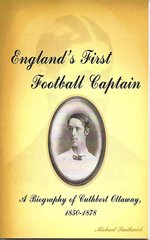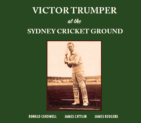England’s First Football Captain
Martin Chandler |Published: 2009
Pages: 67
Author: Southwick, Michael
Publisher: Soccerdata
Rating: 4 stars

Now I will concede at the outset that the title of this book does not immediately jump out as the likely title of a cricket book. And while it does imply that its content is biographical, the name of its subject, Cuthbert Ottaway, is long forgotten, and certainly not one I had ever heard before picking up this fascinating little volume.
Like most cricket followers I enjoy many other sports, and indeed Association Football is my second favourite by a comfortable margin (given the antiquity of the matter in hand the game’s old-fashioned title somehow seems appropriate). But I have never been tempted to start a collection of football books, my entire library on the game amounting to three biographies, of Brian Clough, George Best and Robin Friday, all heroes from my teenage years.
The history of football does not resonate through to the modern game in the same way that the history of cricket does, and the players of the past are simply not remembered in the same way. To most keen cricket fans there are a number of players from the 19th century whose names are familiar, the likes of Grace and Spofforth being the most obvious, but there are many more. I have watched football and taken an interest in the game since not long after England won the World Cup in 1966. But leaving aside those pre World War Two players who I know about simply because they are cricketers who I am aware excelled also at the winter game, the only footballer from before 1939 that I have heard of is Steve Bloomer, and his name strikes a chord only because of my memories of a cricket writer, the great Neville Cardus, waxing lyrical about his skills.
What is now recognised as the very first football International, between England and Scotland, saw Cuthbert Ottaway captain England. The game was played in 1872, five years before England first took on Australia in a Test Match. The game ended 0-0 and, coincidentally, was played on a cricket ground, although that is not the reason why I feel able to review the book here.
Ottaway was an amateur, educated at Eton and Oxford University, who went on to become a barrister. His all-round sporting prowess at University eclipsed even that of the legendary CB Fry, and he was a fine cricketer, and that is why his story has sneaked past Archie’s red pen.
Five generations on few descendants of Ottaway are left, and none of those are British (not too long after his tragically early death his young bride returned home to Canada). That factor, coupled with the paucity of contemporary football writing, and Ottaway’s brief tenure on this earth, all mean that the extent of the information produced by Michael Southwick’s research is particularly admirable.
There were only two football caps for England, but Ottaway also appeared in three FA Cup finals, two for Oxford University and one for Old Etonians. In the last of those, in 1875, he suffered an ankle injury which, it seems, was so serious that it ended his involvement in the sport, certainly at the top level. Given time he might have become the first double international as, in those days before Test cricket, he was picked four times to play for the Gentlemen against the Players, then the game’s greatest contest. He was a batsman/wicketkeeper who, in 1876, averaged more than 62 with the bat, thereby matching WG for the season.
In 1877 Ottaway married in Canada, and that clearly influenced his unavailability for First Class cricket that year, and the following year saw his untimely death at just 27 caused, it would seem, by pneumonia.
Southwick goes back to primary sources and reconstructs Ottaway’s life as best he can and as noted has to leave very little shrouded in mystery. I thoroughly enjoyed reading about footballing pre-history and Ottaway’s role in that and how his life and career developed. His descendants (his wife was carrying his first daughter at the time of his death) are an interesting group of people as well and, the lack of any sporting prowess notwithstanding, the final chapter, which traces the family right up to date was an unexpectedly interesting way to finish off the story of Cuthbert Ottoway.
In attributing a rating to England’s First Football Captain i have to remind myself that relatively few will find its subject-matter sufficiently interesting to want to know more. But if the life and times of Cuthbert Ottaway do appeal, Southwick’s reader will find a well written and thought-provoking little book, which I think is well worth the four stars I am giving it.
Copies of England’s First Football Captain can be bought via the publisher’s website, www.soccerdata.co.uk






Leave a comment